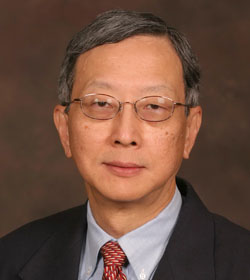I have been watching the discussion about the appropriate name for our profession for some time, hoping it would end quickly. The December 2014 Soapbox article by David Harrington1 proved me wrong, once again. William Shakespeare would probably have called all these discussions “Much Ado About Nothing.” As he wrote in Romeo and Juliet, “What’s in a name? That which we call a rose by any other name would smell as sweet.”
Don’t get me wrong—I do appreciate the fact that names and professional titles help people understand each other, especially nowadays when everyone is so rushed that few bother to listen or study carefully, and the media is focused on sound bites and not substance.
The Historical Context
Let us step back and remind ourselves of the origins of engineering in the mainstream some 300 years ago. Although engineering existed for many centuries before (witness the Pyramids of Egypt, the Great Wall of China, the Parthenon in Greece, etc), the only recognized engineers until then were those who worked in the military. To recruit civilians to work as engineers, schools were created in France to groom civil, as opposed to military, engineers. This gave birth to the Grandes Écoles, such as the famous École Polytechnique.2 Notice that this profession was not called construction engineering or bridge engineering, but just civil engineering, and this name has stuck until today!
All other engineering specialties emerged from civil and other established engineering disciplines when there was a critical mass of engineers who believed it was necessary to distinguish themselves from others. Each engineering discipline needs to have professionals proficient in using its specialized knowledge, as well as leaders who will further advance the field. For example, mechanical engineering separated itself from civil about 200 years ago during the Industrial Revolution, when large mechanical machines and systems were introduced. From it came electrical engineering, which in turn gave birth to electronics engineering and computer science (obviously with significant contribution from applied mathematics). Biomedical engineering became a separate discipline only about 40 or 50 years ago, and was considered a multidisciplinary program in most schools. This was because it not only involves biology and medicine, but also other engineering specialties (eg, chemical, mechanical, electrical, and aeronautical). More recently, even biomedical engineering itself became splintered into other finer specialties, such as tissue engineering, neural engineering, bioengineering, and biomechanics.
In Search of the Right Name
As you may know, the term clinical engineering (CE) was first coined by Cesar Caceres in 1969. Caceres was apparently more concerned about getting engineering support for his research in clinical settings than actual maintenance and management of medical equipment and devices. At that time—and still today to a great extent—biomedical engineers mostly worked in academia or manufacturers’ design laboratories. With few exceptions, they did not work in hospitals or other healthcare organizations.
Some engineers (mostly electrical) were hired by hospitals when the myth of electrical shocks generated by Dr. Carl Walter was publicized widely by Ralph Nader, leading to the creation of the first biomedical engineering (biomed) departments in hospitals. The term CE gained great impetus when the American College of Clinical Engineering (ACCE) was founded in 1990 with CE in its name. Nevertheless, even today many hospitals in the United States still use a variety of other names, such as Medical Instrumentation, Equipment Service, or Clinical Technology.
In several developing countries, academia-based biomedical engineers have looked down upon the maintenance and management of medical equipment and devices, believing it is not a good use of their intellectual abilities (ie, they don’t wish to get their hands dirty). However, resource constraints in those countries have forced the hospitals to open widely their doors to CE professionals. For example, Brazil now has an association called Associação Brasileira de Engenharia Clinica (ABEClin) with several hundred members, and the recently formed Chinese College of Clinical Engineering (CCCE) has thousands of members.
In 2011, a group affiliated with the Association for the Advancement of Medical Instrumentation (AAMI) proposed a new name for the profession: healthcare technology management. In my humble opinion, this would have been an excellent choice 15 or 20 years ago, when information technology (IT) in healthcare was limited to managing mainframes and associated software primarily for patient-billing purposes. With the advent and accelerated adoption of electronic health records, the word technology has been taken over by the IT professionals. One only has to ask some clinicians or healthcare administrators what they think of when the word technology is mentioned to realize that we missed the opportunity already.
The Meaning of Technology
Another persistent debate in our field is the “convergence” between CE and IT (some would call it the absorption of CE by IT).3 Here a brief review of the meaning of the word technology seems worthwhile. Most dictionaries would define technology as the use of science to invent useful things or to solve problems. In other words, technology is a tool for achieving the desired goals and is not the end goal itself. The same or similar tools can be used to build different products or to solve different problems. The professional designation of the users is not defined by the tool used, unless the users are not just expert users but also those who will advance those tools. For example, hammers, pliers, soldering irons, digital electronics, and software can be used by civil engineers to build a house, by mechanical engineers to build a car, or by biomedical engineers to build a medical device. However, each engineering specialty is expert in and will further develop only some of those tools.
Therefore, while CE professionals need to learn and use information technology to maintain, repair, and manage medical equipment, this does not mean that we will develop IT itself or that we should be called IT professionals, much less healthcare IT professionals. If anyone who uses IT tools should be called an IT professional, then pretty much anyone who uses a cellphone, an automobile, or a television should also be called an IT professional, as these devices all incorporate numerous microprocessors and software.
In essence, the name of a profession is what people who practice and advance that profession call themselves, and they will lobby the appropriate agencies and, ultimately, the general public, to adopt that name officially. Any name has a good chance of succeeding if the majority of the professionals adopt it. Unfortunately, until such a consensus is achieved, we will continue to be known as “those guys in the basement next to the morgue that come up to fix things.”
Binseng Wang is Vice President, Quality & Regulatory Affairs with Sundance Enterprises and Adjunct Professor at the Milwaukee School of Engineering. For more information, contact editorial director John Bethune at [email protected].
References
- Harrington D. Health technology management: the wrong title for what we do so well. 24×7. December 2014;19(12):42.
- See, for example, Watson JG. Civil Engineering. Encyclopaedia Brittanica. Available at: www.britannica.com/EBchecked/topic/119227/civil-engineering. Accessed May 1, 2015.
- O’Brien M. Biomed versus IT: is it time to bury the hatchet? 24×7. February 2015;20(2):34.







Binseng, that was about the best telling of the story I’ve seen (although there were already plenty of CEs running around well before 1990). Thank you.
I am not a healthcare technology management professional. I do not like being referred to as one, either. But having entered my seventh decade last October, I’ve decided the argument is not worth my energy and am leaving this discussion to others. What I will say is that when I was in the middle of my third decade, this engineer would not have chosen to attach his professional identity to technology management. Who knows, maybe the field will be better off by attracting only those who are called to that path? Not to worry. It will find out.
I am a traditionalist. There are things you just don’t rename for obvious and superstitious reasons, i.e., children and boats, only two of the examples I have right now. I’m sure others can think of more.
For me when you start changing the name of your group profession, you start showing your indecision, your lack of confidence in your chosen career. Yes, the Biomedical Field has grown in its responsibilities with the growth of technology.
I have accepted a position inside the Plant OPS not just as a Biomed but as a facility service person because of the knowledge I have acquired over the 30 years. I have been a Biomedical Tech and I will stay. I may manage technical health care equipment but I am Biomedical Technician because this facility wanted one. I have learned to adapt and overcome problems that arise with my chosen career field as it changes.
I have second guessed myself with decisions about equipment but never the name my career choice.
There are people that don’t like the name, they want to make it seem more important. It will never be more important than it is right. Who do the doctors, nurses, specialist and admin go to, to make things work right. They go to the “Fix it Guy,” the Biomedical Technician in the Clinical Engineering or Plant OPS departments. They don’t ask for the HTM guy, the want the “Fix it Guy,” the Biomedical Technician.
Leave the name alone. Show some confidence the in field, leave the name alone.